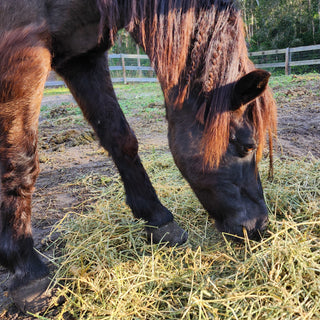Feeding a toothless senior pony with Cushing's presents particular challenges. First, let's discuss feeding Cushing's horses and seniors that lack teeth.
Cushing's disease, also known as pituitary pars intermedia dysfunction (PPID), is a hormonal disorder that affects older horses. It is caused by a tumor in the pituitary gland that leads to an overproduction of the hormone cortisol, which regulates the horse's metabolism, immune system, and response to stress.
Symptoms of Cushing's disease in horses include a long, shaggy haircoat that does not shed properly, excessive thirst and urination, recurrent infections, muscle wasting, and a pot-bellied appearance. The disease can also affect a horse's hooves, causing them to become brittle and crack easily.
Diagnosing Cushing's disease involves a combination of physical examination, laboratory tests, and imaging studies. There is no cure for Cushing's disease, but horses can be managed with medication and dietary changes. It is important to diagnose and treat Cushing's disease as early as possible, as it can lead to serious health problems if left unchecked. Early diagnosis and treatment can help improve a horse's quality of life and extend its lifespan.
For Cushing's horses, we recommend a diet based on low sugar forage. If grain needs to be added to the diet, complete feeds can be beneficial. Some horses with Cushing's may also benefit from dietary supplements that support healthy insulin function and liver function such as vitamin E, chromium, and magnesium.
As for horses without teeth or elderly horses that have lost most of their teeth: these horses have difficulty chewing and digesting regular horse feed. To make sure these horses get the nutrition they need, it's important to choose feeds that are easy to eat and digest. Some options include makes soaked mashes with hay cubes, pellets, senior feeds, beet pulp, and rice bran.
Feeding Cushings ponies or horses with no teeth can be particularly difficult. Soaked hay cubes are your best bet but rice bran can also help.

